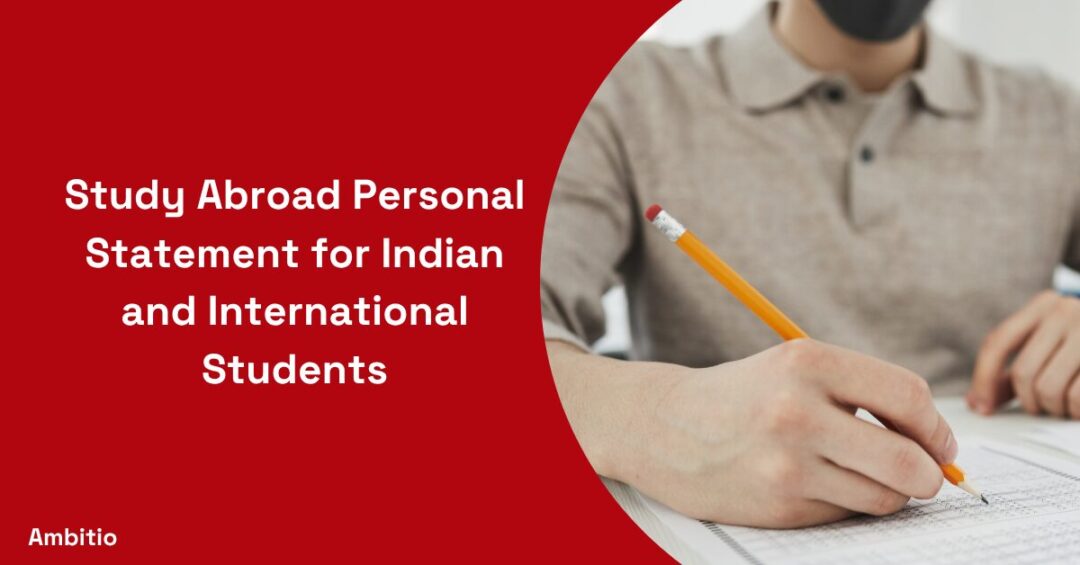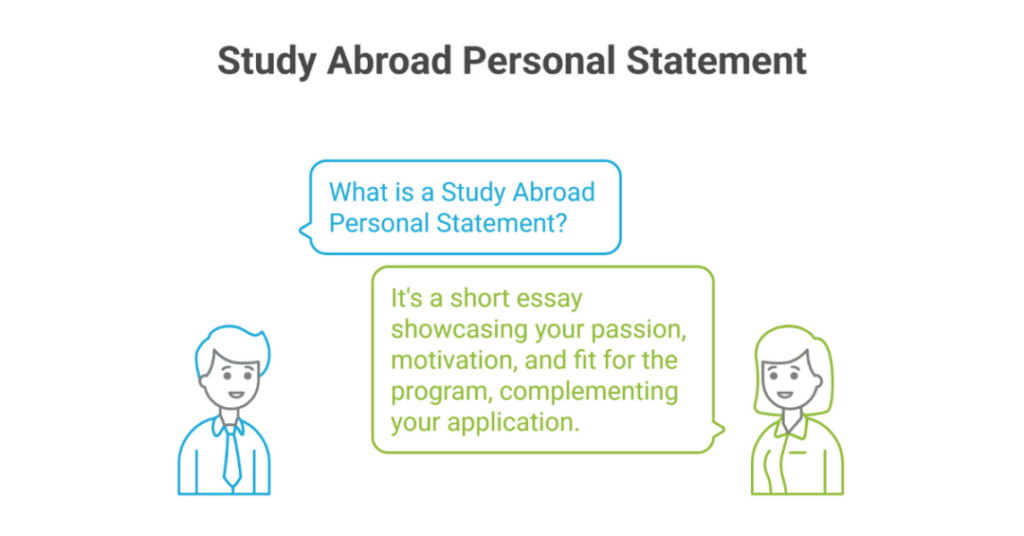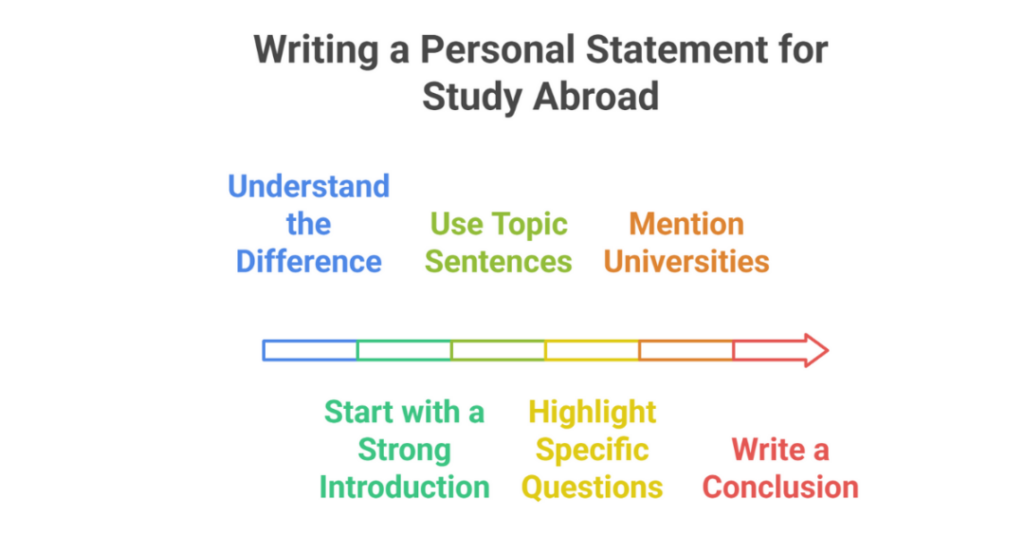2 June 2025
5 minutes read
Study Abroad Personal Statement Example for Indian and International Students

Key Takeaways
- Study abroad personal statement tips help you structure compelling essays that highlight your passion, ambition, and suitability for your chosen program.
- Study abroad personal statement examples reveal how to grab the reader’s attention and stand out to highly competitive university admissions committees.
- Study abroad personal statement guidance ensures you avoid clichés, answer specific questions, and bring unique life experiences to your study abroad application.
Each applicant has a distinctive tale, and the study abroad personal statement is where it is brought to life. If you’re an Indian student or an international student from any corner of the world, developing an engaging story that speaks to admissions committees can differentiate you.
This part of your study abroad application is your voice — a chance to express your aspiration, passion, and motivation. It is not merely a written piece; it is a reflection of your previous experience and your aspiration to follow a preferred course abroad.
If done correctly, it assists you in putting thoughts together and bringing to the program a unique point of view that makes you a suitable candidate.
Universities do not wish to simply hear your scores; they wish to understand what sets you apart, how you write and communicate in English, and how your background complements your experience abroad.
Your personal statement can make or break the rest of your application, and it significantly creates an impact in the admissions office more than you can possibly realize.
What is a Study Abroad Personal Statement?
Fun fact: Admissions officers read thousands of statements every year, but only a few stick. A well-written personal statement can be the difference between acceptance and rejection.
- It is a short essay as part of your application.
- The statement showcases your passion, motivation, and fit for the abroad program.
- It helps acceptance committees understand your personality and goals.
- It complements your resume, ACT/SAT/GRE/GMAT scores, and letter of recommendation.
- It’s often required by universities, study abroad providers, and scholarship boards.
How to Write a Personal Statement for Study Abroad?
Fun fact: Most admissions offices spend less than 5 minutes on each personal statement. That means every paragraph and sentence must grab the reader’s attention.

Before diving into drafting, understand that writing your personal statement involves knowing the difference between a personal statement and a statement of purpose. Here’s a table breaking them down:
| Feature | Personal Statement | Statement of Purpose |
|---|---|---|
| Tone | Conversational and narrative | Formal and academic |
| Content | Past experiences, life stories, goals | Academic background, career plans |
| Purpose | To demonstrate what makes you unique | To explain why you chose a program |
| Length | 500-800 words | 700-1000 words |
| Common Use | Undergraduate, general applications | Master’s, PhD, visa application |
| Relevance | Showcases personality and soft skills | Showcases technical ability and fit |
| Importance | Very high in highly competitive programs | Crucial for graduate studies |
| Additional Use | May be reused for scholarship application | Tailored for each application |
Now, let’s look at how to write a statement:
- Start with a strong introduction that clearly expresses your ambition and interest in the program of choice.
- Use topic sentences to structure your sections and help you write one clear idea at a time.
- Highlight specific questions like “Why do you want to study abroad?” and “What makes you a good fit?”
- Mention universities you’re applying to, like Columbia University, New York University, University of Michigan, Case Western Reserve, Boston College, University of Southern California, University of Chicago, and Fordham University, if they ask for specifics.
- Write a conclusion that ties everything together and reaffirms your passion.
The goal is not just to write a statement but to demonstrate your ability to write and communicate in English, show that you’ve thought through your decision, and that you’ll bring value to the study abroad program.
Top Tips for Writing Your Personal Statement or Essay
Fun fact: One of the most common mistakes students make is rushing the process, leading to clichés and weak conclusions.
- Be honest and authentic in every para.
- Avoid overused phrases like “since childhood” or “I have always been passionate.”
- Keep it concise and avoid fluff.
- Tailor your essay for each study abroad provider or university.
- Ask someone to read it with fresh eyes before submitting.
Do You Need to Write a Personal Statement and Statement of Purpose for a Scholarship?
Fun fact: Many scholarships require both documents, though they serve different roles in your scholarship application.
- Yes, you need to write a personal statement for most scholarships.
- A statement of purpose addresses your academic background.
- A personal statement often focuses on life experience and financial need.
- Together, they give the admissions committee a full picture.
- Always check specific questions asked by the scholarship board.
Personal Statement Example
Fun fact: Your opening line can determine if the reader continues or stops right there.

Ria Sharma, an international student from Delhi, applied to the University of Michigan with a story that still resonates.
“I never thought volunteering at an orphanage in my hometown would shape the path of my future. But one rainy afternoon changed everything. I was 15, helping kids learn basic English when I realized my wish to include everyone in society wasn’t just a fleeting thought—it was a calling. My decision to apply for a Master’s in Social Work at the University of Southern California stems from this moment of clarity.
What draws me most to the program is its holistic curriculum and commitment to diversity. My past experiences—interning at NGOs, initiating mental health workshops in college, and leading community projects—have prepared me to contribute meaningfully. I want to study under professors whose work I’ve followed for years. I believe that this study abroad experience will give me the tools and insight to bring real change back home.
Beyond academics, I’m eager to immerse myself in new cultures and understand the nuances that shape social behavior across geographies. I know the journey won’t be easy, but my ambition and purpose are clear. This personal statement reflects not just my desire to study abroad but a lifetime of intent, action, and hope.”
Do You Need to Proof Read Every Paragraph of Your Personal Statement?
Fun fact: Spelling mistakes or grammar slips have been deal-breakers for students even with stellar resumes.
- Yes, you absolutely need to proof read every paragraph.
- Use tools like Grammarly, but don’t rely on them completely.
- Read your statement aloud to catch awkward phrasing.
- Ask mentors or friends to provide feedback.
- Ensure each para has a clear topic sentence.
- Check for logical flow between ideas.
- Look out for clichés and remove them.
- Confirm that you answered specific questions asked.
- Ensure your strong conclusion reiterates your ambition.
- Double-check every deadline and submission format.
Conclusion
A great personal statement is not just a formality; it’s a vital part of your university admission.
Whether you’re applying to study abroad, seeking a scholarship, or planning to attend a program of choice overseas, your personal statement should reflect who you are and what you bring to the program.
It demonstrates your ability to write and communicate in English, helps you organize your thoughts, and shows the acceptance committee why you’re a good fit. From drafting your essay to final proofreading, every step matters.
Remember, your statement could set you apart in a highly competitive pool of applicants. So write one that counts with Ambitio, your trusted abroad study partner.
FAQs
What is a study abroad personal statement?
A study abroad personal statement is an essay that showcases your motivation, background, and goals when applying to a study abroad program.
How long should a study abroad personal statement be?
A study abroad personal statement typically ranges between 500 to 800 words, depending on the university or scholarship requirements.
Why is a study abroad personal statement important?
A study abroad personal statement helps the admissions committee understand your passion, qualifications, and what makes you a good fit for the program.
What should I include in a study abroad personal statement?
Your study abroad personal statement should include past experiences, academic interests, your ambition, and how the program aligns with your goals.
Can a study abroad personal statement be reused for multiple applications?
Yes, a study abroad personal statement can be adapted, but you should tailor each version to the specific university or program to stand out.
Do I need to submit a study abroad personal statement for scholarships?
Most scholarships require a study abroad personal statement alongside a statement of purpose, resume, and letter of recommendation.
How can I make my study abroad personal statement stand out?
To make your study abroad personal statement stand out, avoid clichés, proofread thoroughly, and write with clarity, authenticity, and purpose.

You can study at top universities worldwide!
Get expert tips and tricks to get into top universities with a free expert session.
Book Your Free 30-Minute Session Now! Book a call now




























